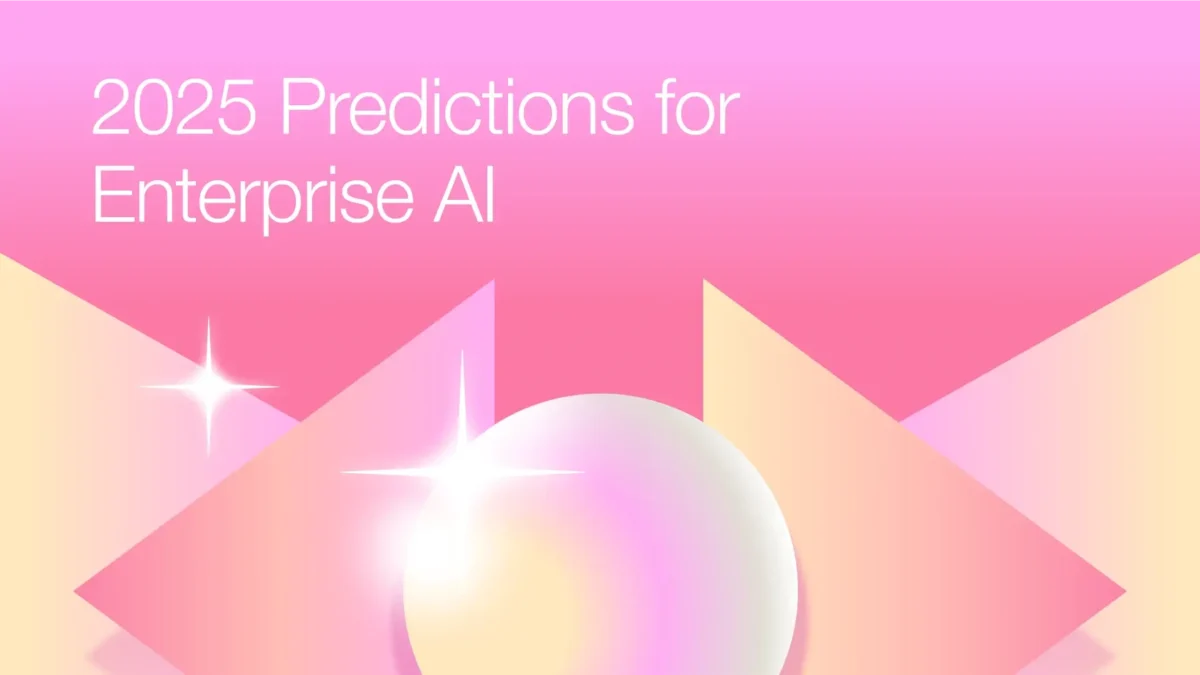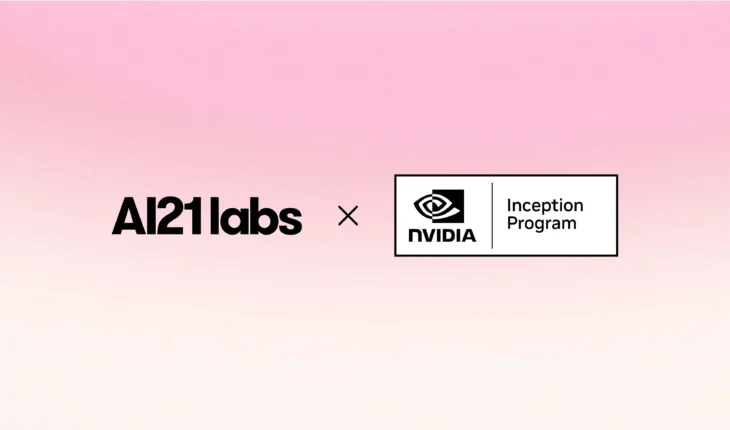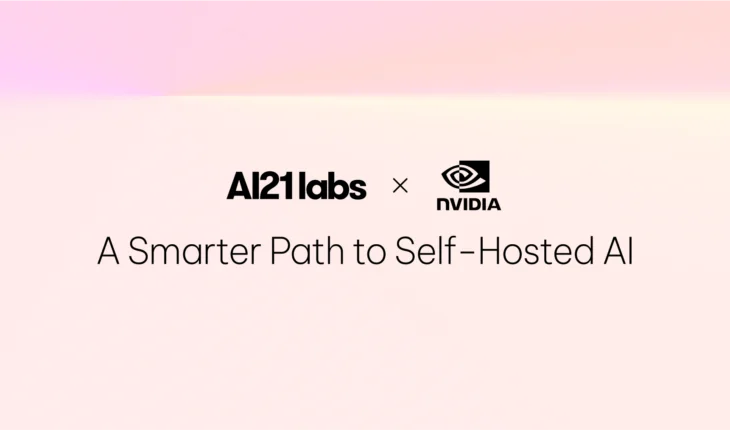Table of Contents

2025 Predictions for Enterprise AI
By 2025, AI is set to enter a new phase—one defined by accuracy , adaptability, and real business impact. Enterprises will move beyond experimentation, harnessing hyper-specialized tools and smarter systems to address challenges at scale and transform the way decisions are made.
To explore these trends, we turned to our partners at Amazon Web Services (AWS), Google Cloud, Microsoft, and Snowflake to share their insights. Let’s dive into the advancements that will reshape business as we know it—and what companies need to do to stay ahead.

The Game-Changing AI Trends You Need to Know
Industry-Specific AI Solutions
AI is trading its one-size-fits-all approach for hyper-specialized solutions tailored to industry challenges. Cameron Wasilewsky, Snowflake’s Technical Lead for AI/ML & Apps Accelerator, nails it: “The biggest advancements in AI impacting enterprises by 2025 will stem from industry-aligned, domain-specific models designed to address specific, high-value business challenges.”
Translation? AI that solves your problem, not everyone else’s.
He continues, “We’re seeing an increasing shift…away from broad, generalized AI solutions rapidly becoming commoditized towards hyper-focused, precision applications that directly tackle key pain points in industries like healthcare, manufacturing, finance, and telecommunications.”
Eduardo Ordax, Principal Go-to-Market for Generative AI at AWS, emphasizes that the real transformation isn’t just about smarter AI: “The real game-changer won’t be having smarter or more capable LLMs—it’ll be how companies scale and integrate AI into their processes and how to drive internal employee adoption.” He understands that this integration will be powered by end-to-end Generative AI platforms that simplify enterprise AI lifecycle management.
Google Cloud’s Director of Applied AI Engineering, Ali Arsanjani, believes that “the combination of larger context windows and RAG is and will continue to transform enterprise operations by enabling more nuanced, domain-specific applications that gain insights from long context and immediate access to retrieved information.”
Fine-Tuned GenAI and Multimodal Models
Generative AI is also undergoing rapid evolution. As Asha Sharma, CVP & Head of Product for Microsoft’s Azure AI Platform notes, “Advancements in fine-tuned generative AI, combined with multimodal capabilities, will drive unprecedented transformation in enterprises by 2025.” She continues, saying “These technologies will enable highly personalized customer experiences, automate repetitive knowledge work, and provide actionable insights from complex datasets in real-time, making organizations faster, smarter, and more adaptive.”
Agentic AI and Multi-Agent Systems
Meanwhile, the rise of agentic AI—multi-agent systems capable of performing sophisticated, autonomous tasks—is creating entirely new possibilities.
AWS’s Ordax highlights this as a key advancement: “AI agents will automate complex processes with minimal human input, drastically improving productivity. The challenge lies in orchestrating workflows, handling dependencies, and handling long-term memory for agents to tackle intricate or complex tasks. Progress here will fuel the next wave of innovation.”
Google Cloud’s Arsanjani emphasizes, “We are currently seeing significant movement, hype, and early demo-level entities emerge [in agentic AI].” He expects it will “provide ample choice and inevitable confusion, consolidation, rationalization and finally, alignment with business goals, and filtering the more practical platforms and technologies… allowing a spectrum of low-code/no-code to APIs for Agentic applications.”
True multi-modal AI systems will further revolutionize business. These systems integrate diverse data sources, such as structured data, unstructured text, and knowledge graphs, enabling strategic innovation. As Arsanjani points out, “Multi-modal advancements…will enable businesses to infuse and integrate diverse data sources, opening the aperture for strategic innovation initiatives.”
Top Sectors Riding the AI Wave
By 2025, certain industries will dominate AI adoption due to their unique needs and opportunities.
Asha Sharma from Microsoft highlights that “industries like healthcare, finance, and retail will lead AI adoption,” specifically leveraging artificial intelligence for “precision diagnostics, fraud detection, and hyper-personalized customer engagement.” The acceleration of this adoption will be driven by key factors including “the democratization of AI tools, continued advancements in reasoning, enhanced compute power, and the growing availability of pre-trained models” that will enable enterprises of all sizes to integrate AI technologies effectively.
AWS’ Eduardo Ordax points out that “regulated industries like financial services, insurance, healthcare, and manufacturing are leading AI adoption. These sectors have strong governance and data privacy foundations, making the leap to AI a small yet impactful investment.”
For specific use cases, Ordax highlights three key areas:
- Software development: “Transitioning from LLMs writing code to full-fledged development agents.”
- RAG (Retrieval-Augmented Generation): “Helping businesses unlock insights from internal data and knowledge bases.”
- Chatbots and assistants: “Still a top priority for enhancing customer interactions.”
Cameron Wasilewsky from Snowflake emphasizes that AI’s transformative potential lies not in its broad capabilities, but in its capacity “to go deep, leveraging a nuanced understanding of the specific workflows, challenges, and regulatory environments within each industry.” This approach is exemplified in sectors like manufacturing, where “startups like LandingAI are innovating with AI-powered vision systems to transform quality control in ways general AI solutions can’t achieve.” The strategy aligns with insights from AI leaders who believe that “solving narrow, industry-specific problems create more tangible value and a sustainable path forward.”
Ali Arsanjani from Google Cloud’s perspective reinforces this industry-specific approach, noting that “industries like agriculture and healthcare will leverage AI for predictive insights and operational efficiencies.” Particularly in healthcare, domain-specific AI applications will provide critical advantages, with finance and manufacturing positioned to lead adoption through “scalable, trustworthy models powered by structured lifecycle practices.” These targeted applications demonstrate how AI can be strategically implemented to address unique challenges across different sectors.
The Biggest Roadblocks to Scaling AI by 2025
Scaling AI sounds great—until you hit the roadblocks. Ordax identifies two critical challenges: “The biggest challenges are twofold: Cultural mindset and talent gaps.” On the mindset front, he explains that “companies need to embrace that AI doesn’t always deliver exact results (e.g., 2+2=3.9). Instead, they must decide if that precision is ‘good enough’ for their goals.” Regarding talent, he notes that “the demand for AI expertise will surge—not just in technical roles but also in legal, compliance, business, and product domains. Filling these roles will be a critical hurdle.”
Snowflake’s Wasilewsky warns about commoditization, noting that “one of the biggest challenges for scaling AI will be overcoming commoditization and maintaining differentiation.” The solution? Go deep. Invest in domain-specific, deeply integrated solutions that outshine generic models.
Then there’s the fragmented data problem. Google Cloud’s Arsanjani doesn’t mince words: “Fragmented data ecosystems and insufficient governance…further exacerbate this issue.” The fix? Build a robust, secure, and agile data infrastructure.
And don’t overlook organizational readiness. Arsanjani highlights: “A major barrier to scaling AI lies in aligning organizational readiness with advanced lifecycle practices, such as robust monitoring and experimentation.” In other words, get your team—and your tools—AI-ready.
AI’s Role in Smarter Decisions and Bold Innovation
AI is turning decision-making into an art form, delivering real-time analytics and insights that unlock new opportunities. Google Cloud’s Arsanjani frames it well: “AI enables businesses to iterate adaptively, integrating ‘deep context’ for strategic decision-making.” It’s not just about data; it’s about smarter strategies.
Responsible AI practices will also play a critical role in building trust. As Arsanjani emphasizes, “Grounding and post-generation validation guard against hallucinations and improve trustworthiness.”
As AI is revolutionizing decision-making processes across enterprises, AWS’ Ordax notes, “AI is already transforming decision-making. For example, at Amazon, AI powers demand forecasting and route optimization to improve delivery times. As companies refine their data strategies, they’ll increasingly rely on AI for critical decisions, embedding it into their innovation and operational processes.”
Wrapping It Up: Ready for the AI-Driven Future?
By 2025, AI won’t just be part of the enterprise landscape—it’ll define it. Expect hyper-specialized solutions, groundbreaking advancements in key industries, and new ways to overcome the hurdles of scale. As our partners remind us, differentiation and agility will separate the leaders from the laggards.
Enterprises that embrace this future with boldness, focus, and responsibility? They won’t just survive—they’ll thrive in the era of transformative AI.


